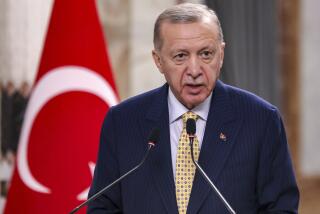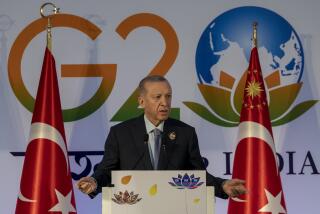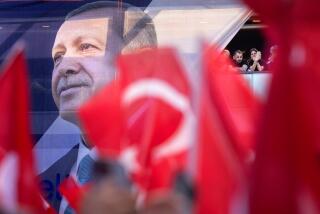Turkey Opens Up to Ex-Soviet Republics
SARP, Turkey — Five decades after the Cold War turned this border post into a hot spot where East met West, the Soviet invasion has finally begun.
But the invaders are largely small-time traders, and the Turks welcome the opening of the frontier as an opportunity to expand trade and influence.
Hundreds of boxy Soviet Ladas, groaning under roof-racks of battered luggage, chug into Turkey each day and the army of would-be entrepreneurs heads for a vast flea market that has sprung up along the Turkish Black Sea coast.
“We used to see the Soviets as a danger,” recalled Mehmet Bahadir, 36, a Turk, strolling past Georgians hawking pink childrens’ scissors, plastic hairbrushes, soccer balls and the odd bottle of vodka. “But no more.”
Turkey, long a NATO bulwark against Soviet expansionism, has opened up to its neighbor.
Boasting of its location, secular tradition and successful transition to a market economy, Turkey is trying to become a bridge between the West and the former Soviet republics.
Turkey has focused its attention on six republics with which it has close ethnic, religious and linguistic ties. But it is also trying to expand links with Russia, an important trading partner. Even relations with Turkey’s historical enemy, Armenia, are rapidly improving.
Other regional powers, including Saudi Arabia, Pakistan and Iran are also jockeying for influence in the Muslim republics.
“Turkey was important in the Cold War, as a pillar of the NATO defense,” noted a European ambassador in the Turkish capital. “If Turkey wants to have this support politically and economically from the West, they have to use this card.”
Foreign Minister Hikmet Cetin undertook a weeklong whirlwind tour of Azerbaijan, Uzbekistan, Kazakhstan, Turkmenistan, Tajikistan and Kyrgyztan. The visit to the largely Muslim former Soviet republics put its focus on economic cooperation.
Turkey was the first to recognize those republics’ independence and has quickly moved to extend its influence in several ways.
* It has sent thousands of alphabet books to persuade them to change from the Cyrillic to the Latin alphabet rather than to Arabic script.
* Some 1,000 students are scheduled to receive scholarships to Turkish universities to study business.
* Turkey recently announced a $10-million project to broadcast Turkish television to the largely Muslim republics, where Turkish is widely understood.
* Turkey’s export-import bank is extending millions of dollars in lines of credit to the republics.
There already is some success.
Azerbaijan has pledged to follow Turkey’s secular model and transition from a state-directed to a free-market economy.
Turkey and Azerbaijan “are like a tree with one root and two branches,” Azerbaijan’s foreign minister, Housseinaga Sadykhov, said with enthusiasm in a recent interview in Istanbul.
The Turks know they don’t have the resources to single-handedly resuscitate the economies of the ex-Soviet republics.
Turkey is hoping its closest ally, the United States, will give it a boost in this competition. By taking part in joint projects with Turkey, Turkish officials argue, Washington would be supporting a democratic, free-market model and checking Iran’s influence.
“We certainly are looking at ways we can work with Turkey . . . to see what we can do for the new republics,” said a U.S. Embassy spokeswoman in Ankara.
The United States and Turkey have already been cooperating on sending aid to the Soviet Union. Turkey is providing 100 tons of foodstuffs.
More to Read
Sign up for Essential California
The most important California stories and recommendations in your inbox every morning.
You may occasionally receive promotional content from the Los Angeles Times.









